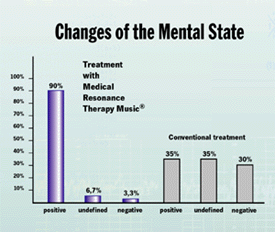Investigated were 56 severely epileptic ill patients in a special hospital for epilepsy. In the experimental group 34 of these patients received in addition to the conventional therapies a treatment with Medical Resonance Therapy Music®, in the control group 22 patients received the conventional drug treatment only.
The application of the Medical Resonance Therapy Music® Group were considered by the patients in 90% of the treatments as successful, in 6,7% of the treatments as undefined and in 3,3% as negative.
The change of the mental state was judged by the patients according to the following criteria:
- a calming effect
- a raising of the spirits
- reducing frequent mood swings
- release of tension
- release of unrest
- reduced violent outbursts of
temper
- reduced irritability
- a general improvement
of the state of health
Here the patients judged 35% of the conventional treatments as successful, 35% of the treatments were experienced as undefined in effect and 30% of the treatments were judged as negative.
Investigators:
Prof. Dr. med. G. Gerassimowitsch
Prof. Dr. med. Walentina Sidorenko
Dr. med. Margarita Gawrisch
Dr. med. Tatjana Teterkina
Dr. med. Sergej Korotkow

